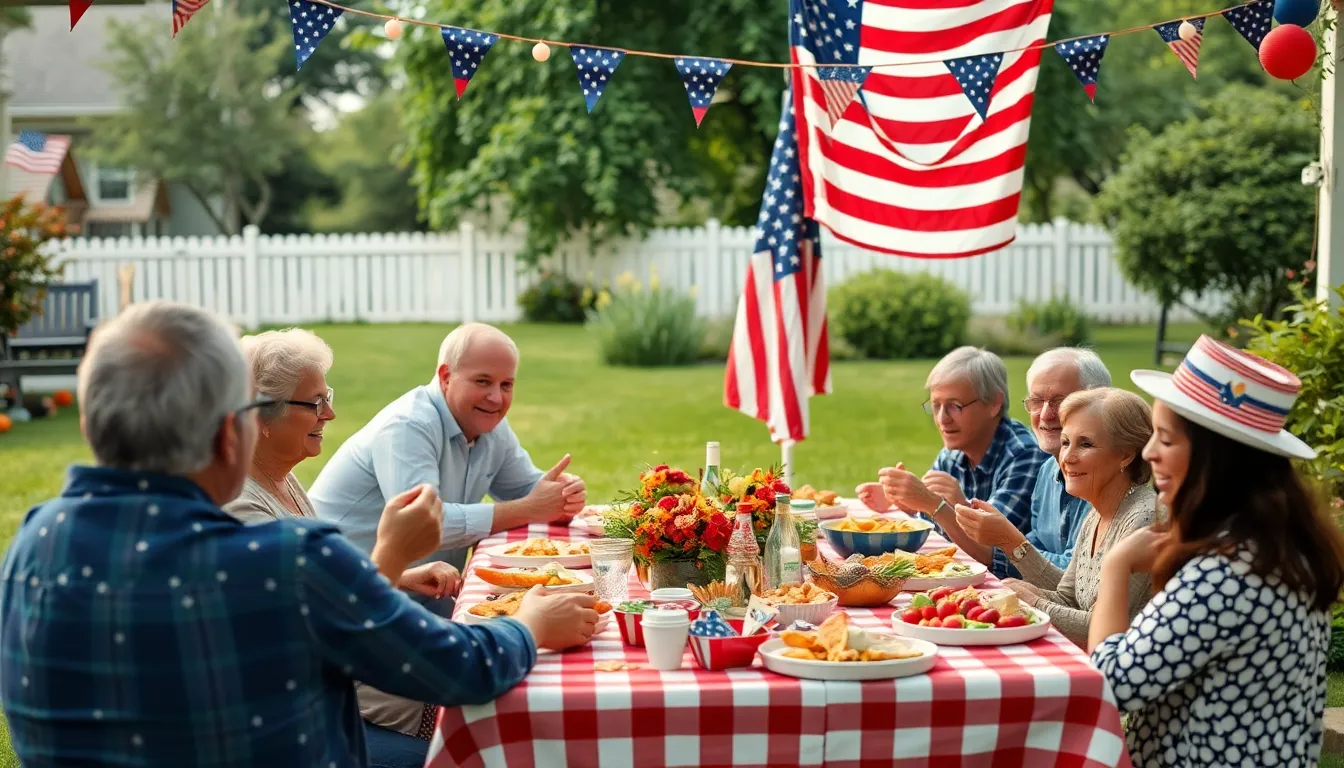Table of Contents
ToggleAs 2025 approaches, it’s time to gear up for the holidays that bring joy and celebration across the United States. Understanding the public holidays, or “días feriados,” is essential for planning vacations, family gatherings, and community events. Each holiday reflects the rich tapestry of American culture and history, offering opportunities to connect with loved ones and honor traditions.
From New Year’s Day to Christmas, these holidays not only provide a break from daily routines but also highlight significant moments in the nation’s past. Whether it’s enjoying a barbecue on Independence Day or gathering around the table for Thanksgiving, these days hold a special place in the hearts of many. Knowing the key dates in 2025 helps individuals and families make the most of their time off and celebrate together.
Overview of Días Feriados en Estados Unidos 2025
Public holidays in the United States for 2025 present key dates for planning vacations, family gatherings, and community events. The year includes recognizable holidays that showcase American values and traditions.
| Date | Holiday Name | Significance |
|---|---|---|
| January 1 | New Year’s Day | Celebrates the beginning of the year. |
| January 20 | Martin Luther King Jr. Day | Honors the civil rights leader’s legacy. |
| February 14 | Valentine’s Day | Celebrates love and affection. |
| April 21 | Easter Sunday | Observes the resurrection of Jesus Christ. |
| July 4 | Independence Day | Marks the ratification of the Declaration of Independence. |
| September 1 | Labor Day | Honors American workers and labor rights. |
| October 31 | Halloween | Celebrates spooky themes and traditions. |
| November 11 | Veterans Day | Recognizes military veterans’ service. |
| November 27 | Thanksgiving | A day for giving thanks, celebrated with feasts. |
| December 25 | Christmas | Celebrates the birth of Jesus Christ. |
Knowing these fechas helps families and organizations prepare in advance. Each holiday offers distinct opportunities for connection and celebration. The diversity of these events reflects the cultural richness of the United States, making them integral to American life.
Federal Holidays in 2025


Federal holidays in the United States provide scheduled opportunities for celebration and reflection. The following details outline the federal holidays observed in 2025.
New Year’s Day
New Year’s Day falls on January 1st. This holiday marks the beginning of the calendar year, celebrated with festivities and resolutions.
Martin Luther King Jr. Day
Martin Luther King Jr. Day occurs on January 20th. This holiday honors the civil rights leader’s contributions and promotes community service.
Presidents’ Day
Presidents’ Day is observed on February 19th. This holiday remembers all U.S. presidents, particularly George Washington and Abraham Lincoln, and celebrates American leadership.
Memorial Day
Memorial Day takes place on May 27th. This day honors military personnel who died while serving in the U.S. Armed Forces, marked by ceremonies and parades.
Independence Day
Independence Day, celebrated on July 4th, commemorates the adoption of the Declaration of Independence in 1776. Festivities include fireworks, barbecues, and patriotic displays.
Labor Day
Labor Day occurs on September 2nd. This holiday recognizes the contributions of American workers and marks the unofficial end of summer with various events and gatherings.
Columbus Day
Columbus Day is observed on October 14th. This holiday celebrates Christopher Columbus’s arrival in the Americas, though some regions recognize Indigenous Peoples’ Day to honor native cultures.
Veterans Day
Veterans Day takes place on November 11th. This holiday honors all U.S. military veterans, with ceremonies, parades, and moments of silence to show appreciation for their service.
Thanksgiving Day
Thanksgiving Day falls on November 28th. This holiday focuses on gratitude and family gatherings, featuring traditional meals and community events.
Christmas Day
Christmas Day is celebrated on December 25th. This holiday commemorates the birth of Jesus Christ, widely recognized with religious services, family gatherings, and festive traditions.
State-Specific Holidays
State-specific holidays in the United States offer unique opportunities for regional celebrations, reflecting local history and culture. Each state observes distinct commemorative events alongside federal holidays.
Notable Regional Celebrations
- California: Cesar Chavez Day, observed on March 31st, honors the civil rights and labor leader’s contributions to farm workers’ rights.
- Texas: Texas Independence Day, celebrated on March 2nd, marks the declaration of independence from Mexico with various festivities and parades.
- Alaska: Alaska Day, occurring on October 18th, commemorates the transfer of Alaska from Russia to the United States, often featuring cultural events and celebrations.
- Hawaii: Discoverers’ Day, held on the second Monday in October, honors Polynesian voyagers who discovered the Hawaiian Islands, complete with traditional ceremonies.
- Massachusetts: Patriot’s Day, observed on the third Monday in April, celebrates the start of the American Revolution with reenactments and parades, especially in Lexington and Concord.
- New York: Lincoln’s Birthday, celebrated on February 12th, recognizes Abraham Lincoln’s contributions, often with educational programs and discussions.
- Oregon: Statehood Day, marked on February 14th, commemorates Oregon’s admission to the Union, promoting awareness of state history through events and activities.
Cultural Significance of Holidays
Holidays in the United States offer profound cultural significance, reflecting shared values and societal norms. Each holiday serves as a moment for reflection, celebration, and remembrance, bringing people together across various backgrounds.
- New Year’s Day: Represents fresh beginnings and renews hope for the coming year, encouraging personal resolutions and community gatherings.
- Martin Luther King Jr. Day: Honors the legacy of civil rights, inspiring dedication to equality and community service. It prompts discussions on social justice.
- Presidents’ Day: Commemorates influential leaders, emphasizing the democratic principles that shape the nation. It encourages historical awareness and national pride.
- Memorial Day: Honors fallen military personnel, fostering appreciation for sacrifice and devotion. Communities hold memorials and tributes, reinforcing unity.
- Independence Day: Celebrates the birth of the nation, marked by fireworks and parades. It reinforces patriotism and national unity through public displays.
- Labor Day: Recognizes the contributions of American workers, highlighting labor rights and worker dignity. It promotes solidarity and respect among various professions.
- Halloween: Blends ancient traditions with modern festivities, ensuring community engagement through costumes and festivities. It fosters creativity and fun among children and families.
- Veterans Day: Honors military veterans, promoting gratitude and respect within communities. Events recognize service and sacrifice, bolstering civic pride.
- Thanksgiving: Centers on gratitude, family, and community gatherings. It highlights the importance of relationships and shared meals, reinforcing social bonds.
- Christmas: Celebrates cultural and religious traditions, emphasizing generosity and goodwill. Festive activities deepen community ties and promote harmony.
State-specific holidays contribute additional cultural layers, showcasing local traditions and historical narratives. Examples include:
- Cesar Chavez Day: Celebrates labor rights and farmworkers’ contributions, promoting awareness and advocacy for social justice.
- Texas Independence Day: Marks Texas’ independence, enhancing local pride and historical identity within the community.
- Alaska Day: Commemorates the land acquisition, instilling a sense of heritage and historical significance.
- Guardian’s Day: Celebrated primarily in Hawaii, emphasizes the role of indigenous culture and traditions in modern society.
- Patriot’s Day: Remembers the battles of Lexington and Concord, reinforcing historical awareness and community spirit in Massachusetts.
Understanding these holidays enhances appreciation for cultural diversity and community engagement, underscoring the values and history interwoven in American life.







